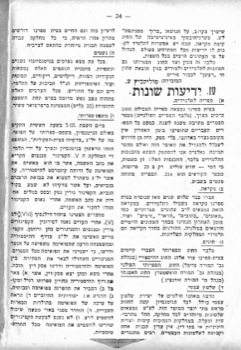A) Library for the Pupils
The library in our school contains ~1000 books (in addition to the Polish books). The number of books increases every year. None of the new Hebrew books is missing from the library. We would have added to this treasure but there is no support for that and we depend only on the fees the pupils pay per month, which is a scant 25
prutot. There are 214 readers. The library is open twice a week.
B) A Reading Room
The reading room exists already 3 years. It contains mainly literary newspapers such as
Moznayim,
Ktuvim,
HaDo’ar,
Zramim, etc. Lately, a variety of daily Polish newspapers were introduced. The pupils on duty are of the top classes.
C) Circles
Apart from the Literary Hebrew Circle, we have an Historical Circle (led by teacher
Tzvibl), Polish literary Circle (led by Teacher
Hofshteter), and Art Circle (led by teacher
Zidentzig).
D) Autonomous Government
Many of us dream of having an autonomous government of the whole
gymnasium. It is difficult to foresee when this institute will materialize... In the meantime, there are self-governing bodies for each class from the 4
th grade. In the lower grades there are councils for Hygiene or “court rooms”. There is not one comprehensive program for these bodies. Many oppose this idea and also life in our school demands a different solution. Evidently, each class worked out a program that suits its needs.
E) Parties
We throw balls and parties at every opportunity. They include: staged plays, poetry recitals, dances, photos, etc. Pupils and parents like these events. The atmosphere and mood at such events is very elated, especially under the effects of the orchestra –22 instruments– that is noted for its rich repertoire.
F) A Literary Trial
Saturday, the 5
th of March at 6 o’clock we held in the hall of our school a literary trial on the Poem by Y.L. Gordon,
Tzidkiyahu in Prison. This was the first trial of its kind in the gymnazium and was staged by the 5
th grade.
Tenenboim was the prosecutor and read the indictment, accusing the Poem for its being contrary to history, Y.L.G. for trying to find the Rabbis mirrored in the Prophets, Tzidkiyahu for not heeding the prophet.
The prosecutor,
Gorin, detailed and argued and the indictment. Then the witnesses were called to be interrogated.
Among the witnesses,
Vilenski (8
th grade) and
Lev (5
th grad) did especially well. After them, the prosecutors Tenenboim and Gorin and the defense counsels spoke alternately. The prosecutors accused Y.L.G. of forging history and of the bad influence the poem has on youth and demanded to take out this poem from all the books. The defense counsels tried to explain the discrepancy between the poem and history and demanded an acquittance.
The verdict:
- Described the forging of history as an ordinary literary phenomenon.
- Explained the reasons for exaggeration in a poem.
- Emphasized the positive elements in the poem.
- Noted the value of poems in the history of Hebrew literature.
- Warned against a wrong interpretation that may mislead and have a bad effect.
- Did not accept the demand of the prosecutors to take the poem out of all the textbooks.


